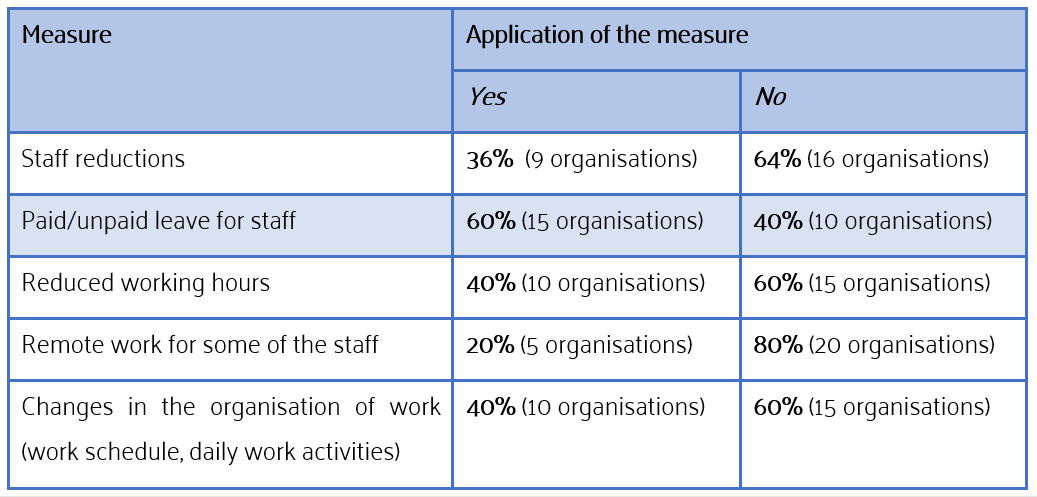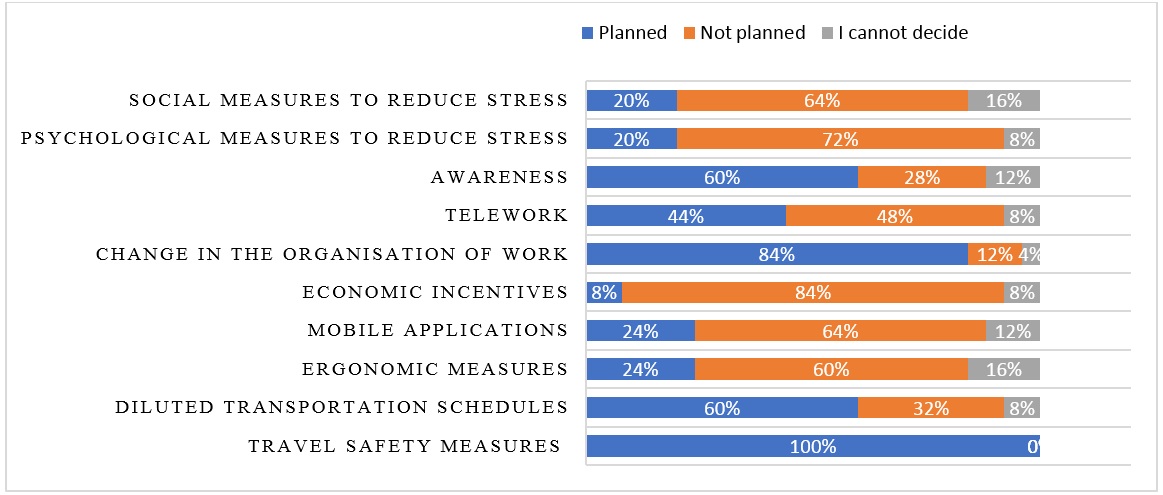Managerial measures at the workplace in the Bulgarian transport sector during COVID-19
 Magdalena Parcheva
Magdalena Parcheva
PhD, University of Varna, Bulgaria
The transport sector in Bulgaria during the COVID-19 pandemic
Bulgaria has good conditions for functioning and development of rail, road, air, water (river and sea) transport. Strengths of the Bulgarian transport sector include the favourable geographical location of the country; a high degree of construction and density of the existing transport infrastructure; established transport connections between the railway network, ports and national road infrastructure; a high degree of liberalisation of the transport market and increased competition, especially in the field of land transport services; and harmonised transport legislation with the European Union.
An Integrated Transport Strategy for the period to 2030 has been adopted and implemented in Bulgaria – a strategic document for sustainable development of the transport system and a framework for investments [1]. The transport sector was one of the worst affected in the first wave of the COVID-19 pandemic, passenger transport more than freight. Several measures regarding personnel and work processes have been taken to deal with the situation.
In the fourth quarter of 2020 both the transported goods and the work performed by land and water freight transport increased compared to the respective quarter of 2019. At the same time, there was a decrease in transported passengers (by 38%) and the work performed in million passenger-kilometres (by 53,2%) of passenger transport compared to the same quarter of the previous year [2]. Compared to European countries in our country the reduction is the largest [3]
To deal with the COVID crisis and overcome its consequences, companies in the transport sector have the opportunity to receive financial support through specialised public measures: (a) Financial incentives to maintain employment in the transport and tourism sectors 80/20, BGN 290 per month; (b) Support for SMEs performing bus transport to overcome the economic consequences of COVID-19 through the implementation of a support scheme by the Ministry of Transport, Information Technology and Communications under the “Innovation and Competitiveness” 2014-2020 Operational Programme.
Despite these opportunities for public financial support, a survey by the Bulgarian Chamber of Commerce amongst 810 companies from all sectors shows that few companies apply for the anti-crisis measures and they have limited effects. Only 12% of the companies in the transport and tourism sectors have benefited from the employment retention measure [4].
Workplace changes in the context of COVID-19: an empirical study among organisations in the transport sector in Bulgaria
In order to monitor the impact of the COVID-19 pandemic on business as well as actual and planned management measures, an empirical survey was conducted in August 2020 among 25 organisations with different activities: urban transport, intercity and international transport, tourist transport and freight transport, representing different regions of operation, numbers of staff and size of fleet.
The analysis of the field of activity of the surveyed companies shows that large enterprises in the transport sector are active in a wide range of activities: passenger transport, logistics and warehouses, tour operators and travel agents (tourist transport, organisation and conduct of excursions and events, sale of airline tickets), hospitality, a combination of passenger and freight transport, car wash, green energy, sale and repair of vehicles, taxi transport, business transport.
The crisis caused by COVID-19 has affected the activities of the surveyed organisations. All companies realise financial losses. The majority of respondents (18) indicated that they had reduced their activities – 12 organisations had made significant redundancies and 6 – partial redundancies. Due to the specifics of the field, three public transport operators have not reduced their activity, but have realised significant financial losses.
In view of the requirements of the COVID-19 pandemic, the following measures were implemented in all organisations: (a) staff awareness of the risks of the virus and precautions; (b) provision/use of personal protective equipment by workers and regular disinfection; (c) restriction of office visits.
Of interest are the measures taken in terms of staff and labour processes in the enterprises covered in the study (Table 1).
The most commonly applied measure in a crisis situation is the use of paid and unpaid leave for staff. A significant part of the organisations (40%) work part-time or have made changes in labour processes related to changes in the work schedule and daily work activities of employees (40% of respondents). Remote work with the help of modern information and communication technologies is not often a measure applied to some of the staff with administrative functions in the surveyed enterprises. The crisis resulting from COVID-19 has led to staff reductions in 9 companies (36%).
The development of the epidemic situation brings to the fore the need to plan measures, implementing specific actions by organisations in order to ensure survival. Within this, an essential part should be the action plan for safety and health and redesign of labour processes, such as approaches to reducing the impact of psychosocial risk factors, and the study included a question about planned measures in this direction (Fig. 1).
In parallel with the measure planned by all companies to ensure travel safety, 84% of respondents intend to change the organisation of work (work schedule, working hours, shifts, breaks), and 60% of companies will reduce their travel schedules, shrinking activity. The least popular measure is the introduction of economic incentives such as discounts for customers both during the crisis and in the period after the pandemic. 24% (6 companies) rely on the potential of modern information technologies and technical means in the pandemic, intending to use electronic and mobile applications in working with citizens.
The specificity of the sector presupposes the performance of labour activity at the workplace and the applicability of telework only for a part of the staff with administrative functions, when the nature of the obligations allows it. A relatively small part of the surveyed organisations have implemented such a measure and/or plan to take it (11 enterprises).
Some of the implemented and planned measures are mandatory due to the anti-epidemic restrictions imposed by the government. Municipal transport companies and large companies consult with trade unions when taking a measure. In small firms, decisions are made mainly by the manager.
Regarding the reduction of the impact of work-related psychosocial risk factors in the conditions of COVID-19, the distribution of the responses of the organisations covered in the study is as follows:
- management measures aimed at raising awareness: 60% of respondents (15 organisations) declare that they will provide information to employees on health issues and business-related measures envisaged to address the situation;
- improving the physical environment and ergonomic measures: similar actions are envisaged in only 6 companies (24%).
- measures for psychological support of specialists such as stress monitoring and psychological support programmes: similar actions are planned in 20% of respondents (5 enterprises), 80% do not envisage a commitment to stress assessment for specialists.
- measures for social support of specialists such as management incentives for informal social contacts through electronic means, attention from managers and recognition of the results of specialists: the number of enterprises planning special support is small – 20% of respondents.
Conclusions and recommendations
The study of workplace changes in COVID-19 allows the following conclusions to be drawn:
- The crisis as a result of COVID-19 has an extremely negative impact on the financial results of the organisations in the transport sector in Bulgaria. The financial losses are combined with a significant contraction of activity for small carriers, oriented mainly to the transport of tourists, some of whom have reduced staff.
- A significant challenge for public transport operators and large transport companies for intercity, international and freight transport, is to ensure the continuity of activities in the case of declining financial results, compliance with disinfection measures and distance, balancing “changes in working hours – necessary staff”, and increased psychosocial risk as a result of the pandemic. The deepening and complicating of the epidemic situation would bring to the fore the problem of dealing with a high percentage of absentees and carrying out the business activity of the transport organisation.
- The approaches for providing psychological and social support to the specialists are relatively unpopular measures. This would have a negative impact on the extent to which workers are exposed to psychosocial risk.
In this crisis situation, the subject of assessment, analysis and management impact should not only be opportunities for business survival but also the new psychosocial risks in the workplace. In the context of COVID-19, the sensitivity of organisations to social problems, the application of approaches to overcoming them and the search for opportunities to create a favourable psychosocial work environment is a matter of paramount importance as well as theoretical research in the field of management and safety and health, labour and management practice.
The following recommended actions regarding the management measures for change of the workplace in the conditions of COVID-19 stand out in the practical-applied plan:
- Provision of forms for public financial support through programmes in the transport sector, including measures related to labour processes, risk assessment.
- Encouraging the application of measures for social and psychological support of specialists in the conditions of COVID-19
- Redesign of the management system and the system for safety and health and development of an action plan of the organisation in crisis situation.
Acknowledgement
This article is based on:
Parcheva, M. Managerial and Ergonomic Measures for Reducing Psychosocial Risk Factors in the Workplace Under COVID-19. Izvestia Journal of the Union of Scientists – Varna. Economic Sciences Series, 2020, vol. 9, issue 1, 109-119.
Dr Parcheva is Head of the Scientific Division, Social, Economic and Legal Sciences Research Institute, Technical University of Varna, Bulgaria.
Share This Story!

European Workplace Innovation Network (EUWIN)
EUWIN was established by the European Commission in 2013 and is now entirely supported by contributions from an international network of partners co-ordinated by HIVA (University of Leuven). EUWIN also functions as a network partner for the H2020 Beyond4.0 project.
Contact: Workplace Innovation Europe CLG (contact@workplaceinnovation.eu).

